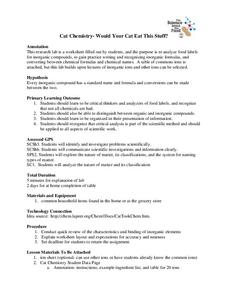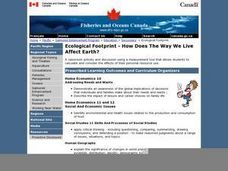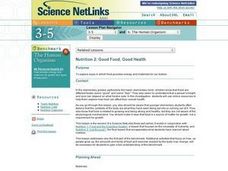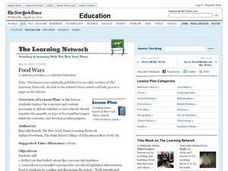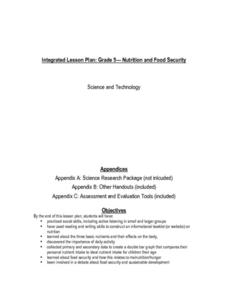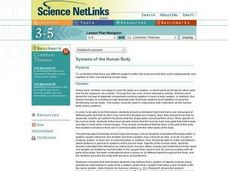Curated OER
The Circulatory System - Part II
First graders recognize that the heart muscle requires food. Students observe a Venn Diagram to identify foods that are good for them. Students provide one ingredient to make healthy heart soup.
Consortium for Ocean Science Exploration and Engagement (COSEE)
Arctic Smorgasbord
Though the walrus spends roughly one third of its time on land, it eats organisms that live on the bottom of the ocean. The first in a series of five, the lesson uses a variety of plant and animal cards to have scholars build an arctic...
Curated OER
Quinoa Pasta 3
A mixture of quinoa and corn is for dinner in this collaborative task that sets up nicely as a system of linear equations. Your supper guests discuss numerical precision and percentages as they formulate a plan of how to solve the problem.
Curated OER
Sippin' on Smoothies
Why is calcium good for the body? Where is it stored? Young chefs discover the importance of calcium and review a list of foods that are rich in the material. They then make delicious smoothies high in calcium! Teaching kids how to make...
Baylor College
Bio Build-up
Trace pollutants through the environment in the seventh lesson of this series on the science of food. Looking at a picture of the plants and animals in an aquatic ecosystem, learners use dot stickers to represent harmful chemicals as...
Nemours KidsHealth
Food and Cooking Safety: Grades 3-5
In lesson one, scholars read articles, brainstorm a list of tips, then vote on the most important ones. Using those tips, the class creates a mural detailing them with magazine cutouts. Lesson two challenges pupils to cook a dish at home...
Curated OER
Dietician - Nutritionist
There are so many different career opportunities in the health care field. Have learners explore what it takes to be a dietician or a nutritionist. They'll view a PowerPoint on each occupation and take mini-quizzes while they watch. A...
University of Georgia
Would Your Cat Eat This Stuff?
Processed foods use inorganic compounds for flavoring and preservation. This take-home laboratory challenges scholars to find 20 different compounds identified on the labels of foods to list on their data collection sheet. The activity...
Curated OER
What Does Earth Day Mean? - Biology Teaching Thesis
Young scholars possible sources of water pollution, and explain the effects that water pollution can have on the food on the food chain. They Name human and other animal (i.e. fish) illnesses that can be contracted from drinking polluted...
Curated OER
Exploring Owls
What can young scientists discover from dissecting an owl pellet? Explore the owl food chain, beginning with an introduction to these predatory birds. Suggested strategies here include creating a podcast and purchasing a poster, however...
Curated OER
Ecological Footprint--How Does The Way We Live Affect Earth?
Young scholars demonstrate an awareness of the global implications of decisions that individuals and families make about their needs and wants. They identify environmental and health issues related to the production and consumption of...
Curated OER
Quinoa Pasta 2
Learners discover that a system of linear equations models this mixture of quinoa and corn in a collaborative task. Your learners receive all the relevant information in this second of three variants of tasks that ask them to find the...
Curated OER
Biological Relationships
Create a written document to show knowledge of producers, consumers, decomposers, and symbiotic relationships. To investigate food consumption, your classes will differentiate between types of symbiosis and explain examples of each.
Curated OER
Food Myths Critical Thinking and Reading
Students read a series of statements made by students about the hazards and benefits of various foods. They distinguish the "facts: from "opinions" in the dialogue, summarize the facts in a short paragraph, and write an essay...
Curated OER
Good Food, Good Health
Students investigate how food provides energy for the human body. In this physical health lesson, students access online resources to identify how certain foods can affect their health. Students discuss how many servings of each food...
Curated OER
Food Wars
Students investigate the debate whether schools should regulate the amount or type of food and drink students consume. They write and present position papers after reading an online NY Times article.
Curated OER
Nutrition and Food Security
Examine the three basic nutrients and their effects on the body. Fifth graders will research data to construct a bar graph and then demonstrate the relationship between malnutrition and food security. This is a very comprehensive...
Curated OER
Family Traditions, Customs and Beliefs
Students discuss African childhood, explore family traditions, customs, and beliefs, examine African recipes, discuss differences or similarities in food preparation between the U.S. and Africa, and prepare a dish with adult supervision.
Curated OER
Nutrition 1: Food and the Digestive System
Students are introduced to how the digestive system works in their body. In groups, they discover they need energy and water to live a healthy life. They discover how the body repairs itself and how it grows. They also examine how...
Curated OER
The Big Picture: Systems
Students study the ways that agro-ecosystems function to support sustainable agriculture. For this investigative lesson students examine the different cycles of ecosystems and food systems.
Curated OER
Food Insecurity in a Global World: Perspectives from Africa
Students investigate food shortages. In this global issues lesson, students examine how food scarcity issues have impacted the people of Easter Africa. Students use the information they gather to determine methods of providing food to...
Curated OER
Biology: Systems of the Human Body
Students examine the different systems of the human body and how they work independently and cooperatively. They complete sevral online interactive projects designed to reinforce how the systems work alone and together. Students make...
Curated OER
The Quicker the Better? Food Processing
Sixth graders evaluate the nutrition of various foods. In this healthy eating lesson, 6th graders discuss the processing of many common foods and what this means. Students identify and research unfamiliar ingredients in processed foods...
Curated OER
The Science and Technology of Food
Students examine the guidelines the United States Department of Agriculture places on food. In groups, they create a list of the foods they consume and discuss the political and environmental implications of purchasing the food. They...









